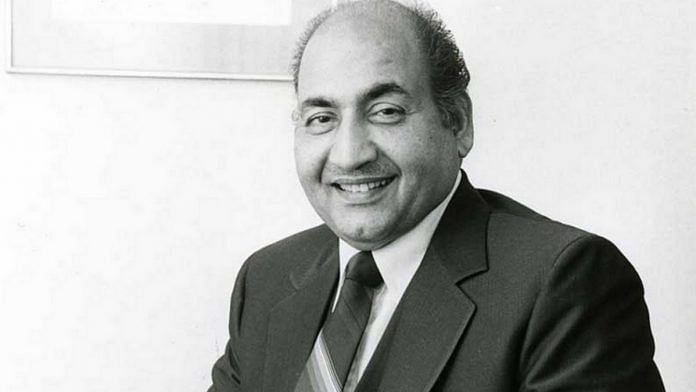From 1963 to 1967, Lata Mangeskhar and Mohammed Rafi — the undisputed queen and king of playback singing — didn’t feature together in a single duet over a dispute on payment of royalty.
What happened during those four years is supremely telling about Rafi’s versatility and authority as a playback singer. As the two had fallen out, music directors had to find alternatives for duets—female alternatives, that is. And that’s when a number of voices were discovered. At the expense of Lata. The most prominent was Suman Kalyanpur who had a striking resemblance to Lata’s voice.
As for Rafi, he was so indispensable to the Hindi film music that there was no replacement. This, despite the presence of several established male singers including Mukesh, Talat Mahmood, Kishore Kumar, Manna Dey and Mahinder Kapoor.
Rafi continued to reign supreme. Lata realised the futility of the feud and with intervention from S. D. Burman chose to patch up. The duo resumed their association much to the joy of the film fraternity and music lovers.
Today, more than 40 years after his death on 31 July 1980, Rafi — and Lata Mangeshkar—continue to wield their influence in popular culture.
Also read: The grand musician — Naushad Ali gave Lata Mangeshkar her big break
The irreplaceable mascot
In 1968, Rafi was to record Dil Ki Awaz Bhi Sun Mere Fasane Pe Na Ja for Joy Mukherjee’s Humsaya with music composer O. P. Nayyar. Rafi and O P. were fond of each other and had collaborated on dozens of super melodies already over a couple of decades.
As it happened, an otherwise punctual Rafi turned up late. O.P. was a little unhappy and expressed his frustration. Rafi explained that because of frequent retakes at Shankar Jaikishan’s recording, he couldn’t reach on time. This irritated O.P and in a fit of frustration, he told Rafi: “I don’t need you.”
O.P and Shankar Jaikishan had a long history of rivalry which could have triggered his response. A gentleman that he was, Rafi said: “Let’s record the song and then we can part ways.” After the recording, Rafi left the studio quietly and the two didn’t get to work for another four years.
Known for his temper, O.P. replaced Rafi with Mahendra Kapoor thus scripting his own decline. The two did patch up later but the damage was done. O.P. confessed later that he got too carried away and shouldn’t have misbehaved. He also admitted that he was the loser because of the break-up and nobody could render his tunes the way Rafi could.
In the fifties and the sixties, Rafi was the irreplaceable mascot of Hindi film music. Even at the peak popularity of the R.D. Burman-Kishore Kumar combine, Rafi kept delivering one hit song after another. It included a number of songs with R.D. Burman too – most notably the solo Kya hua tera wada from Hum Kisise Kam Nahi (1977) that won him the Filmfare Award for best male singer and National Film Award.
Rafi’s love for singing began at a young age. He was mesmerized by a crooning mendicant on the streets of Lahore whom he would follow for hours to listen to the khedan de din char ni mayi khedan de din char – a Punjabi philosophical take on life.
After being spotted by Shyam Sunder at a stage show in Lahore, the music director gave Rafi a break in a Punjabi film Gul Baloch. The music director later gave him his first Hindi song when Rafi moved to Bombay to try his luck.
When Rafi was introduced to music director Naushad who had started establishing himself as the leading composer, he was readily impressed by the young singer but didn’t want to bond over with him hurriedly. Naushad took his time, giving Rafi a solo here, a duet there. It included a famous chorus Ruhi Ruhi Ruhi from Shah Jahan (1946) on Rafi’s request. He wanted to sing alongside K. L. Sehgal.
But it was just a matter of time before Naushad would launch him in a big way and Rafi would become every music director’s first choice for male singer.
Before Rafi became Dilip Kumar’s permanent voice, the thespian had already done two movies that had music by Naushad: Mela (1948) and Andaz (1949). All the songs picturised on Dilip Kumar in the two movies were given to Mukesh. And then, in1951, Deedar happened and Rafi became Dilip Kumar’s voice forever.
Other music directors who looked up to Naushad as a trendsetter followed suit. Rafi became the most valuable asset of other greats like S.D. Burman, Shankar Jaikishan, O.P. Nayyar, Madan Mohan, Roshan and many others who in their unique ways modelled Rafi’s voice and style.
While Naushad unleashed the power of Rafi’s vocal chords exhibiting his ability to sing in high notes, Burman used the velvety texture of the songster to create that sensuous, romantic effect.
O.P. Nayyar’s lilting tunes can never be imagined without Rafi’s malleable voice with those subtle tweaks that never jump out on a listener. No voice could’ve matched the power of Shankar Jaikishan’s resounding orchestra taking it to another level.
The ethereal divinity that Rafi brought into the compositions of Madan Mohan and Roshan is just unparalleled. There are dozens of other composers for whom the maestro delivered timeless gems through decades. Whether it’s the impeccable Khayyam or the unsung genius Chitragupt, Rafi never fell short of perfection under anyone’s baton.
As trends kept changing, Rafi continued to remain abreast with the mood of the time and gave so many hits under Laxmikant-Pyarelal, R.D. Burman, Kalyanji-Anandji and many others after them, like Ravindra Jain, Bappi Lahiri et al.
Rafi was a divine genius and the breadth and sweep of his versatility can’t be covered in a single write-up.
Shabir Hussain is the Editor of Srinagar-based kashmirnewsline.net. He tweets @Hussainesque
(Edited by Anurag Chaubey)



